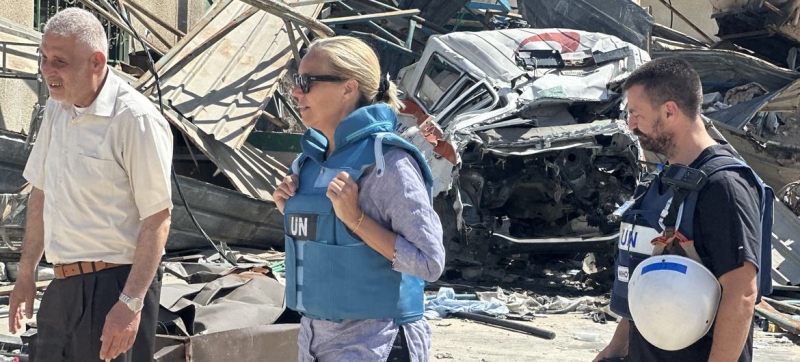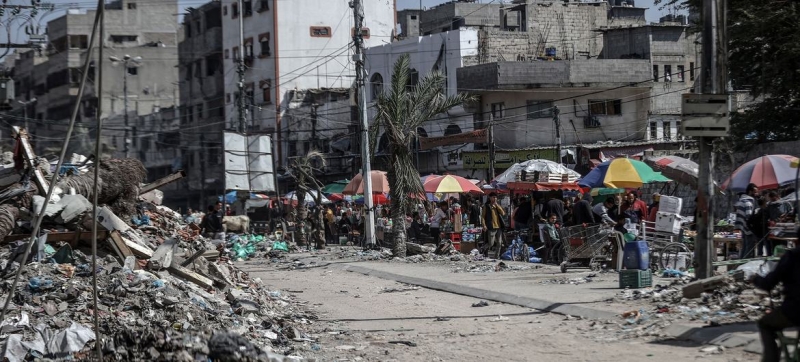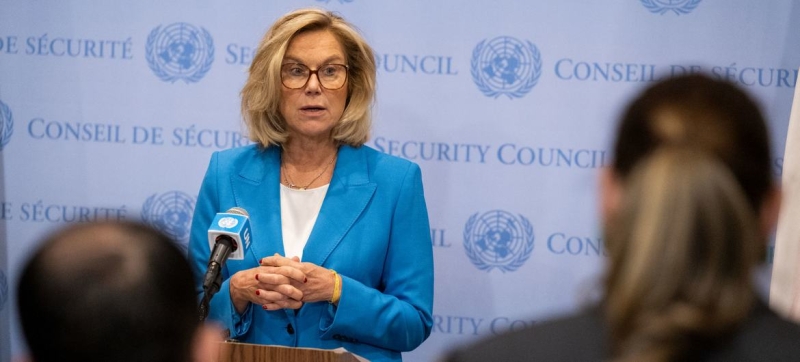
Sigrid Kaag in Gaza. Sigrid Kaag: Relieving the suffering of Gazans is our collective responsibility Humanitarian assistance
Large destruction, inhumane conditions – these are the impressions of Sigrid Kaag, the UN Senior Coordinator for Humanitarian Affairs and Reconstruction in the Gaza Strip, on a recent trip to the enclave. She spoke more about her visit in an interview with the UN News Service.
SC:The purpose of the trip, of course, was to meet, negotiate and gain as much information as possible about the challenges, problems and how we can make progress. Another goal is to support all humanitarian colleagues who work daily in the Gaza Strip. What I saw in different parts of Gaza that we passed during this visit, and this was my fourth visit, was massive destruction. Talking to people and hearing from them how it affected them, hearing about their losses, their traumas. And, of course, how they manage to cope with the very, very difficult, almost inhumane conditions in which most Gazans live.
This time the trip focused on the health situation in the Gaza Strip, and I was accompanied by a WHO team. We visited the Nasser medical complex, which was completely destroyed inside. But the medical director was already planning how he could restart the hospital, at least partially.
I also visited the IMC field hospital where many of the seriously wounded are being treated, including wounded and malnourished children. I talked to patients as well as doctors. And I was very touched, but of course I am aware of the collective responsibility that we all have in terms of alleviating the suffering [of the population], and we must try to work as hard as possible not only to deliver humanitarian aid, but and to ensure that it reaches people on a consistent and sustainable basis. And, of course, we also need to look beyond the horizon of the current crisis.

Destruction in the Gaza Strip.
UN News Service: Resolution 2720, which requests the establishment of your post, also calls for the creation of a mechanism to increase the supply of humanitarian aid to Gaza. What is our position on this issue and what are the problems in creating this mechanism?
SC:I think the resolution is actually critical in two ways. This is to facilitate and speed up the delivery of humanitarian aid to Gaza, and the second aspect is to create a mechanism to support this and ultimately also to support the collective efforts of the UN, international NGOs, as well as Palestinian NGOs and the wider international community.
Over the past months we have created an integrated database. We have agreed routes, the so-called Jordan route. We are working on a maritime corridor, of course, also given the importance of the Egyptian route through Rafah, to ensure that we have access points, that we can increase [supply] volumes and that we can actually track, notify and better understand what is going to be sent to Gaza in accordance with the priorities set by the local humanitarian team. And then in Gaza itself we must understand that aid reaches the people and is distributed in an optimal way. You see, the mechanism is not a sacred institution, it is a platform that provides insight, helps set priorities and provides data. And ultimately, he must make the process smooth. This way we will get rid of all unnecessary delays, we will know what is happening. And ultimately it will also provide much-needed transparency.
UN News Service: You spoke about the possibility of creating a sea corridor, and there is a lot of talk about this now. What is our position on this issue?
SC:There is still very active work going on right now. But you may recall that in February the United Nations authorized me, on behalf of the UN, along with a number of foreign ministers of committed countries and the Government of Cyprus, to say that we see value in an additional maritime corridor. We are trying to understand how this can be made a reality – both from the UN and from humanitarian organizations in Gaza.
We are studying under what conditions, according to what parameters, the UN could participate in the receipt and distribution of [aid] in the Gaza Strip. There are also safety considerations here. We certainly have serious security concerns about the distribution [of aid] and the safety and security of civilians. A number of issues are being considered.
Read also:
To provide assistance in Gaza and the West Bank, UNRWA requires $1.2 billion
From the UN, within the framework of this mechanism and my mission , we host a secretariat to support Member States who wish to ship cargo through Cyprus. There are observers in Cyprus. And we support this process from the very beginning and, I hope, to the end.
And this is an important route, however, as I have said many times before, it does not replace the importance of supporting future recovery and reconstruction – goods must flow into Gaza. And the main thing is land routes, land and once again land, and this is our main goal. But additions are welcome, given the complexity of the situation and the totality of needs not only now, but also in the future.
UN News Service: Concerns are growing over the safety of aid workers in the Gaza Strip. And the humanitarian workers themselves are worried about their safety. What is being done to, so to speak, strengthen the “deconflict” mechanism and ensure that they can do their job?
SC:Yes, it is certainly a horrific situation when so many aid workers, most of them Palestinians, have died. In any situation of war and conflict, this is always a big risk. And people risk their lives to serve others. This is the most noble sacrifice, but we should not accept this state of affairs. Deconflict is a long-standing and important topic for discussion, and, of course, active negotiations. Deconfliction is a very sensitive and complex process, but it requires very clear understanding, communication, respect, of course, for the role of humanitarian workers and agreements about how their activities are carried out. This is affecting humanitarian convoys. This affects distribution. This requires very clear and very specific agreements, which we are negotiating with the Israeli authorities and, in particular, of course, the IDF plays a key role here.

Sigrid Kaag at the UN headquarters.
UN News Service: I know that the focus right now is on the humanitarian crisis. But the war continues, and we see scenes of destruction that are beyond comprehension. Is it possible to restore at this stage?
SC: I I think this is a rhetorical question. I think we have a duty of care, we have a responsibility, and we have a duty to think about the Palestinian civilian population in the Gaza Strip and work closely with the Palestinian Authority. Of course, we – and the Secretary-General has said this many times – we hope for their early return to Gaza so that they can lead this process. The Palestinian Authority has reform, there is a plan for the Gaza Strip. And a lot of research has been done. If this is possible, I think it will be a very difficult task.
If you look at the scale of the damage, even just clearing away the rubble, and the need to restore housing as quickly as possible, return children to school, or at least create other places for education, so that it doesn’t turn out that a generation grows up that does not have access to proper education. For Palestinians, this has always been a source of pride.
We have a responsibility to ensure that restoration work begins as quickly as possible. We have to think about reconstruction as well as financing. I am, of course, very aware that this is inextricably linked with progress on the political front, with the two-state solution. But we can’t ask civilians to wait. Life goes on, and people have already suffered enough.
UN News Service: Speaking of human suffering, I would now like to touch on the issue of restoration. Because as you said, we have a responsibility to rebuild Gaza, but how can people who lived through these horrors find hope and move on with their lives?
SK: Healing the soul is a very personal process. And I think it’s very difficult for us, in the safety of the outside world, to even begin to understand what these people went through. Children suddenly left without a single living relative. Children who had to undergo amputations without anesthesia. Families who have lost their children, their homes, or have repeatedly fled their homes.
Healing – not just physical – requires attention, we must support healing from mental trauma. This is baggage that people will have to carry throughout their lives. Great attention is paid to psychosocial and mental health support in crisis situations.
When I worked in the Dutch government, we led many international efforts in this direction, and I asked a number of colleagues with whom I communicate to treat this aspect as no less more important than food, shelter, water. Otherwise you cannot be a whole person. This aspect requires special attention for many years to come. And here, although the Palestinians in Gaza have ultimately proven very resilient, they need significant support. We need experts. We need psychologists and psychiatrists. We need those who will train specialists.
